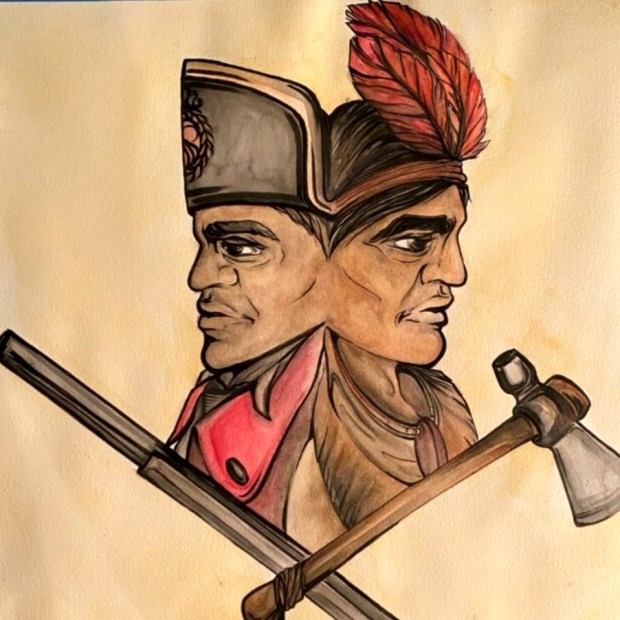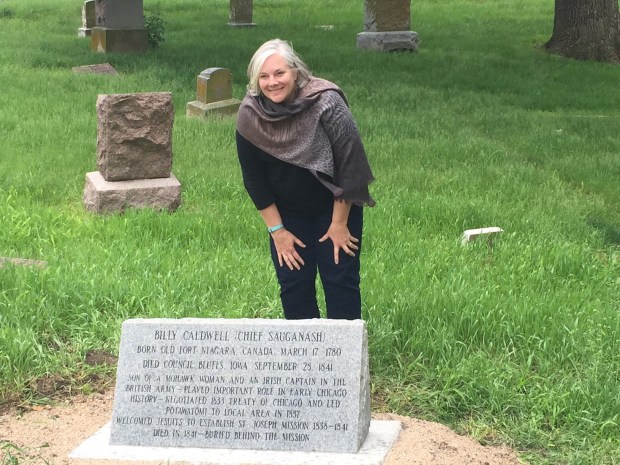Sauganash is as lovely a neighborhood as there is in the city. Located on the Northwest Side, it is quiet and peaceful, with tall trees, wide lawns and fine homes. It is a place well suited for long walks and that was what Susan Kelsey was doing one day more than three decades ago when she came upon something that would lead her deep into the history of Chicago and introduce her to a man who would shadow the next three decades of her life, and shadows her still.
“That’s right, “ she says. “I was just walking when I noticed a historical marker that mentioned Sauganash and Billy Caldwell and I realized that I did not know anything about the name of the neighborhood in which I was living with my family and that I had never seen the name Billy Caldwell before.”
Her “passion, or maybe we should call it obsession,” she says, has resulted in a fine book, “Billy Caldwell: Chicago and the Great Lakes Trail 1780-1841,” and an award-winning and tremendous feature length film, “The Negotiator: Billy Caldwell Documentary,” which will be shown Thursday at the Illinois Holocaust Museum, presented by the Mitchell Museum of the American Indian.
On her fateful walk in 1993, Kelsey worked for the American Medical Association. She was not a trained historian and this was, of course, before she could avail herself of the find-anything-you-want-in-seconds “miracle” of the internet.
So off to the library she went. It was relatively easy for her to discover that “Sauganash” was an Indian word meaning “English-speaking” or “Englishman” and, long before giving its name to her neighborhood, had attached itself to Caldwell.
If you know that name only as that of a nine-hole golf course run by the Forest Preserve, Kelsey’s work in print and film will enlighten you, persuasively explaining why he was one of the most important of the thousands who have shaped and shared this place we call home. Yes, Jean Baptiste Point du Sable was the first permanent resident here, but Caldwell was far more impactful.
He was born on March 17, 1780, near Fort Niagara in what is now New York state. His mother was a Mohawk woman named Rising Sun and his father, William Caldwell Sr., an Irishman serving in the British army. The boy was raised alone by his mother until he was about 8 years old and his father took him away to be educated by Jesuits in Detroit where he learned to speak English and French, in addition to native languages he knew as a child.
Caldwell would earn his living as a fur trader and also serve as an interpreter for various tribes, making his way to Chicago when there was little else here but Fort Dearborn and a few families. He helped early settlers, saving the lives of many who were captured during the Fort Dearborn Massacre in 1812. He further distinguished himself when he became a justice of the peace.
By the 1820s, then known as “Chief Sauganash” and was named chief for three Chicago tribes — Ottawa, Ojibwa and the Potawatomi — primarily so that he would negotiate treaties intended to remove or otherwise get rid of the Native Americans. He was certainly popular. That early hospitality entrepreneur, Mark Beaubien, named his tavern and hotel Sauganash after Caldwell.
The Treaty of Chicago in 1833 was then the largest land trade in American history, at five million acres. It allowed white settlers to occupy the Midwest and Lake Michigan area, and called for the removal of thousands of Native Americans to “Indian Territory” west of the Missouri River.
By the treaty, Caldwell and a few others were awarded large parcels of land. His was along both sides of the Chicago River and called the Billy Caldwell Indian Reservation. Even though he could have stayed here and enjoyed a life of some comfort and stature, he began to sell the land before heading west in 1836. He negotiated the safe passage of the Chippewa, Ottawa and Potawatomi out of Illinois. Under Caldwell’s leadership and with an Army escort, some 700 Potawatomi headed west, settling in what would become the city of Council Bluffs in Iowa. That is where Caldwell died on Sept. 28, 1841.
How’s that for an interesting life? And those are just the details. The book and film explore how this man, caught between two worlds, believed he was doing his best he could so that he and his people could survive. (Neither we or the film much address the sadly familiar atrocities).
“There was no way for him to stop the advance of white people,” says Kelsey. “He did the best he could in the treaties, preventing what would have been bloodshed.”
Though there have ever been and might continue to be arguments about whether Caldwell was a hero or traitor. I’ll side with the hero and will ever be taken with something Kelsey told me, “Billy Caldwell was someone who was searching for an identity his whole life.”

In making her film, Kelsey worked with Michelle Simon of the Prairie Band Potawatomi Nation, forming a partnership “and a great friendship.” They fill their movie with some stunning historical graphics and documents, a chorus of intelligent commentators and compelling music. It has won many awards on the film festival circuit and will continue to do so.
Kelsey now lives in Lake Forest but Billy Caldwell and Sauganash remain part of her life. And Caldwell is part of the neighborhood, inside the baptistry of the basilica of Queen of All Saints in the form of a stunning stained glass window, more than fitting because, in another fascinating fact from the past: in 1833, Billy Caldwell helped found the first Catholic Church in Chicago.
Film and discussion of “The Negotiator: Billy Caldwell Documentary” is 7 p.m. June 20 at the Illinois Holocaust Museum & Education Center, 9603 Woods Drive, Skokie; tickets $40 at ilholocaustmuseum.org
rkogan@chicagotribune.com




